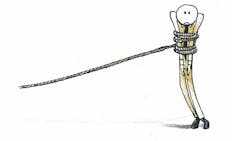Why You Must Avoid the Deadly Logic Trap
“All right, what’s the next step?”
How many times have you heard that question being asked—in meetings with other executives or managers, or in discussions with suppliers or customers, or in talks with community representatives?
To ask "what’s next" is a logical step toward getting beyond the present, its successes, its failures, and its under-performances. In the world of manufacturing, it’s a common question.
And yet, I suggest, the next step should not necessarily be a logical step. It does not necessarily follow from the present. What, for example, if your underlying strategic premise is in error? It follows that, unless you revisit your production or marketing or distribution or social premise, your actions will be less effective—if not just plain failures.
There’s no better place to start those challenges than with questioning your strategic premises.
Sure, logic is comfortable way of structuring the complexity of manufacturing in a competitive world, of making stuff that is inherently complicated more understandable. For example, logic can be useful in identifying critical elements and exploring probable outcomes. And for sorting the irrelevant from the relevant virtually anywhere along the manufacturing supply chain.
Yet the fact remains that manufacturing in an intensely competitive and changing world of business is complex and complicated, even at times, to use an inelegant phrase, terribly messy. The next step is, in reality, many steps taken now and in the future—and they need to be challenged over and over again.
There’s no better place to start those challenges than with questioning your strategic premises. If you expect to prosper in business, you and your colleagues must question what you are doing now and what you have been doing for years. Ask whether they are relevant; ask whether they are effective; even ask what you might be doing instead. Examine the value chain link by link.
Carefully consider the answers, as they relate to product, supply, distribution, marketing, customers. Carefully consider the answers, as they relate to quality and process. Carefully consider the answers as they relate to employees, shareholders, and communities.
After questioning strategic premises, question implementing tactics. Ask if they are relevant. Ask if they are effective. Even ask what you might be doing instead.
Logic as an academic exercise can lead to unexpected and alarming conclusions. Indeed, a series of formally structured premises and conclusions can lead to positions the polar opposites of what is relevant and realistic. Logic fails. Trust me, I have participated in such exercises.
You and your colleagues owe it to yourselves—and to everyone else in the value chain—to not fall victim to the logic trap. The next steps do not necessarily follow directly from the present or the recent past.
This is another of a series of occasional essay by John S. McClenahen, an award-winning writer and photographer who retired from IndustryWeek as a senior editor in 2006.
About the Author
John McClenahen
Former Senior Editor, IndustryWeek
John S. McClenahen, is an occasional essayist on the Web site of IndustryWeek, the executive management publication from which he retired in 2006. He began his journalism career as a broadcast journalist at Westinghouse Broadcasting’s KYW in Cleveland, Ohio. In May 1967, he joined Penton Media Inc. in Cleveland and in September 1967 was transferred to Washington, DC, the base from which for nearly 40 years he wrote primarily about national and international economics and politics, and corporate social responsibility.
McClenahen, a native of Ohio now residing in Maryland, is an award-winning writer and photographer. He is the author of three books of poetry, most recently An Unexpected Poet (2013), and several books of photographs, including Black, White, and Shades of Grey (2014). He also is the author of a children’s book, Henry at His Beach (2014).
His photograph “Provincetown: Fog Rising 2004” was selected for the Smithsonian Institution’s 2011 juried exhibition Artists at Work and displayed in the S. Dillon Ripley Center at the Smithsonian Institution in Washington, D.C., from June until October 2011. Five of his photographs are in the collection of St. Lawrence University and displayed on campus in Canton, New York.
John McClenahen’s essay “Incorporating America: Whitman in Context” was designated one of the five best works published in The Journal of Graduate Liberal Studies during the twelve-year editorship of R. Barry Leavis of Rollins College. John McClenahen’s several journalism prizes include the coveted Jesse H. Neal Award. He also is the author of the commemorative poem “Upon 50 Years,” celebrating the fiftieth anniversary of the founding of Wolfson College Cambridge, and appearing in “The Wolfson Review.”
John McClenahen received a B.A. (English with a minor in government) from St. Lawrence University, an M.A., (English) from Western Reserve University, and a Master of Arts in Liberal Studies from Georgetown University, where he also pursued doctoral studies. At St. Lawrence University, he was elected to academic honor societies in English and government and to Omicron Delta Kappa, the University’s highest undergraduate honor. John McClenahen was a participant in the 32nd Annual Wharton Seminars for Journalists at the Wharton School at the University of Pennsylvania in Philadelphia. During the Easter Term of the 1986 academic year, John McClenahen was the first American to hold a prestigious Press Fellowship at Wolfson College, Cambridge, in the United Kingdom.
John McClenahen has served on the Editorial Board of Confluence: The Journal of Graduate Liberal Studies and was co-founder and first editor of Liberal Studies at Georgetown. He has been a volunteer researcher on the William Steinway Diary Project at the Smithsonian Institution, Washington, D.C., and has been an assistant professorial lecturer at The George Washington University in Washington, D.C.
